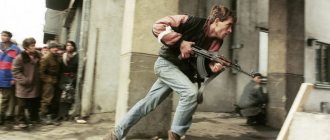1. Restriction of freedom consists of the court establishing the following restrictions for the convicted person: not to leave the place of permanent residence (stay) at a certain time of the day, not to visit certain places located within the territory of the relevant municipality, not to travel outside the territory of the corresponding municipality, not to visit places of mass and other events and not to participate in these events, not to change the place of residence or stay, place of work and (or) study without the consent of the specialized government body that supervises the serving of sentences by convicts in the form of restriction of freedom, in cases provided for by the legislation of the Russian Federation Federation. In this case, the court imposes on the convicted person the obligation to appear at the specialized state body that supervises the serving of sentences in the form of restriction of freedom by convicted persons from one to four times a month for registration. The establishment by the court of restrictions on a convicted person to change his place of residence or stay without the consent of the specified specialized state body, as well as to travel outside the territory of the relevant municipality is mandatory.
2. Restriction of freedom is imposed for a period of two months to four years as the main type of punishment for crimes of minor gravity and crimes of average gravity, as well as for a period of six months to two years as an additional type of punishment to forced labor or imprisonment in cases , provided for by the relevant articles of the Special Part of this Code.
3. During the period of serving a restriction of freedom, the court, on the proposal of a specialized state body supervising the serving of a sentence in the form of restriction of freedom by convicted persons, may partially cancel or supplement the restrictions previously established for the convicted person.
4. Supervision over a convicted person serving a restriction of freedom is carried out in the manner prescribed by the criminal executive legislation of the Russian Federation, as well as the regulatory legal acts of authorized federal executive bodies issued in accordance with it.
5. In the case of a convicted person’s malicious evasion from serving a restriction of freedom imposed as the main type of punishment, the court, on the proposal of a specialized state body supervising the serving of a sentence of restriction of freedom by convicts, may replace the unserved part of the punishment with forced labor or imprisonment at the rate of one a day of forced labor for two days of restriction of freedom or one day of imprisonment for two days of restriction of freedom.
6. Restriction of freedom is not imposed on military personnel, foreign citizens, stateless persons, as well as persons who do not have a place of permanent residence on the territory of the Russian Federation.
- Article 52. Repealed
- Article 53.1. Forced labor
Commentary to Art. 53 of the Criminal Code of the Russian Federation
Punishment in the form of restriction of freedom is included in the punishment system and is provided for in Art. 44 of the Criminal Code of the Russian Federation. It should be noted that, in fact, under a new name, legal institutions that existed in the Soviet period of Russian history have been restored, such as suspended sentence to imprisonment with the mandatory involvement of the convicted person in labor and conditional release from places of imprisonment with the mandatory involvement of the convicted person in labor (Article ... Articles 24.2 and 53.2 of the Criminal Code of the RSFSR).
The content of punishment in the form of restriction of freedom is disclosed in Art. 53 of the Criminal Code of the Russian Federation and consists in keeping a convicted person in a special institution without isolation from society under conditions of supervision over him. This type of punishment can only be imposed on persons who have committed a crime and have reached the age of eighteen at the time the court pronounces the verdict.
Restriction of freedom is assigned only as the main punishment to persons who have committed intentional crimes and have no criminal record, for a period of one to three years. For persons convicted of crimes committed through negligence - from one to five years. Thus, the terms of punishment are correlated with the nature of the crime and the personality of the convicted person. Persons without a criminal record are persons against whom no previous convictions have been made, who have been released from punishment, as well as persons whose criminal record has been withdrawn or expunged in accordance with the procedure established by law. According to Part 3 of Art. 53 of the Criminal Code of the Russian Federation, restriction of freedom may be imposed for a period of less than one year when replacing compulsory labor or correctional labor with restriction of freedom.
The period of restriction of freedom is calculated from the day the convicted person arrives at the correctional center.
The period of restriction of freedom includes the time of keeping the convicted person in custody as a preventive measure and the time of traveling under escort from a correctional institution to a correctional center when replacing the unserved part of imprisonment with restriction of freedom at the rate of one day in custody for two days of restriction of freedom, as well as the time of short-term departure after release from a correctional institution until arrival at a correctional center.
The period of restriction of freedom does not include the time of unauthorized absence of the convicted person from work or place of residence for more than one day.
Since the restriction of freedom in its content is related to the involvement of the convicted person in labor, it is not prescribed to disabled people of the first or second group, pregnant women, women with children under the age of fourteen, women who have reached the age of fifty-five, and men who have reached the age of sixty. This type of punishment is also not imposed on military personnel undergoing military service upon conscription (Part 5 of Article 53 of the Criminal Code of the Russian Federation).
Restriction of freedom is applied only as the main punishment (Part 1 of Article 45 of the Criminal Code of the Russian Federation). Currently, this type of punishment is a deferred measure.
Restriction of freedom in correctional centers is carried out. They are subject to the internal regulations of correctional centers, approved by the Ministry of Justice of the Russian Federation in agreement with the Prosecutor General's Office of the Russian Federation.
In accordance with Art. 50 of the Penal Code of the Russian Federation, those sentenced to restriction of freedom are under supervision and are obliged to:
a) comply with the internal regulations of correctional centers;
b) work where they are sent by the administration of the correctional center;
c) stay within the correctional center at all times and not leave it without permission from the administration. For convicts who have been assigned restriction of freedom as a substitute for a more lenient punishment, in necessary cases, the administration of the correctional center may allow travel outside its boundaries for a period of up to five days immediately after the convict is registered, if such departure was not permitted by the administration of the correctional institution after release;
d) live, as a rule, in dormitories specially designed for convicts and not leave them at night without permission from the administration of the correctional center;
e) participate without pay in work to improve the buildings and territory of the correctional center in the order of priority, as a rule, during non-working hours - lasting no more than two hours a week;
f) always have with you a document of the established form identifying the convicted person.
It is necessary to pay attention to the fact that convicts who have been sentenced to restriction of freedom in order to replace the unserved part of the sentence with a more lenient type of punishment, and those sentenced to restriction of freedom by a court verdict, as a rule, cannot be kept in the same correctional center. In addition, according to Part 5 of Art. 50 of the Penal Code of the Russian Federation, convicts who have previously served imprisonment and have a criminal record are kept separately from other convicts; Those convicted of a crime committed as an accomplice serve their sentence separately.
Responsibility is provided for violation of the procedure and conditions for serving restrictions on freedom and for malicious evasion of serving restrictions on freedom. In the first case, the convicted may be subject to such penalties as a reprimand, prohibition from leaving the hostel at a certain time of day for up to one month, placement in a disciplinary detention center in accordance with the internal regulations of correctional centers for up to fifteen days.
In case of malicious evasion of the convicted person from serving his sentence, restriction of freedom in accordance with Part 4 of Art. 53 of the Criminal Code of the Russian Federation is replaced by imprisonment for the period of restriction of freedom appointed by a court verdict. The time served for restriction of freedom is counted towards the term of imprisonment at the rate of one day of imprisonment for one day of restriction of freedom.
Malicious evasion from serving a sentence is the unauthorized abandonment of the territory of a correctional center by a convicted person without good reason, failure to return or untimely return to the place of serving a sentence, leaving a place of work or place of residence for a period of more than twenty-four hours.
Everything about criminal cases
Go to the Criminal Code
Url Additional information:
Restrictions
- Part 1 53 of the Criminal Code
restriction of freedom consists in establishing restrictions:
- Part 1 53 of the Criminal Code
do not leave your place of residence at night
- Part 1 53 of the Criminal Code
don't go to certain places
- Part 1 53 of the Criminal Code
travel outside the area
- Part 1 53 of the Criminal Code
do not attend public events
- Part 1 53 of the Criminal Code
do not change your place of residence
- Part 1 53 of the Criminal Code
appear for registration (1 - 4 times a month)
Term
- Part 2 53 of the Criminal Code
if the main punishment is from 1 month to 4 years
- Part 2 53 of the Criminal Code
if the additional punishment is from 6 months to 2 years
Primary and additional punishment
- Part 2 53 of the Criminal Code
main punishment for minor or moderate severity
- Part 2 53 of the Criminal Code
as an additional punishment to imprisonment
Execution
- Part 3 53 of the Criminal Code
restrictions can be canceled or added
- part 4 53 of the Criminal Code
supervision over the execution of restrictions on freedom
Evasion
- part 5 53 of the Criminal Code
replaced (2 days of restriction = 1 day of imprisonment)
Not assigned
- Part 6 53 of the Criminal Code
military, foreigners
Plenum of the Supreme Court
- paragraph 17
Plenum No. 58 features of appointment in the form of restriction of freedom
- paragraph 34
Plenum No. 55 deadlines for each, but restrictions for the final
- paragraph 22
Plenum No. 21 specification of restrictions after the verdict
Additional Information
— Chapter 8
PEC enforcement of restrictions on freedom
— Part 2 45 Criminal Code
restriction of freedom may be an additional punishment
LOOKING FOR BUGS (only VIP
- subscribers)
Restriction Features
freedom in case of aggregation of crimes
Article 53 of the Criminal Code. Restriction of freedom
Url Additional information:
— clause 12 part 1 308 Code of Criminal Procedure
indication in the sentence of the type of restrictions
- paragraph 22
Plenum No. 21 specification of restrictions after the verdict
1) Restriction of freedom consists of the court imposing the following restrictions on the convicted person:
- do not leave your place of permanent residence (stay) at a certain time of the day,
Url Additional information:
- paragraph 19
Plenum No. 58 should indicate the signs of such places
- do not visit certain places,
Url Additional information:
- paragraph 18
Plenum No. 58 establishing the boundaries of the territory when restricting freedom
- do not travel outside the municipality,
Url Additional information:
- paragraph 19
Plenum No. 58 what is meant by places of public events
- do not visit places of mass and other events
Url Additional information:
- Part 4 50 PEC
consent to leave the place of permanent residence
- paragraph 18
Plenum No. 58 specific territory - only the main punishment
- do not change the place of residence or stay, place of work and (or) study without the consent of the supervisory authority.
Url Additional information:
- paragraph 19
Plenum No. 58, the court must indicate a specific number of appearances during the month
— appear for registration with the supervisory authority 1 to 4 times a month.
2) Restriction of freedom is assigned:
- for a period from 2 months to 4 years as the main type of punishment for crimes of minor
or medium gravity,
- for a period from 6 months to 2 years as an additional type of punishment to forced labor or imprisonment in cases provided for in the relevant articles of the Special Code parts of the Criminal Code.
3) During the period of serving the restriction of freedom, the court, on the proposal of the supervisory authority, may:
- cancel partially,
— or add restrictions.
Url Additional information:
— 60 PEC
supervision of serving restriction of freedom
4) Supervision is carried out in the manner prescribed by penal legislation.
Url Additional information:
- Part 7 58 PEC
change to imprisonment
- clause 5.8
Plenum No. 21, if the main punishment, then a replacement, if not, then
314 of the Criminal Code
5) In case of malicious evasion of the convicted person from serving the restrictions of freedom assigned as the main type of punishment, they are replaced with forced labor or imprisonment
at the rate of 1 day of forced labor per 2 days of restriction of freedom or 1 day of imprisonment for 2 days of restriction of freedom.
6) Restriction of freedom is not imposed:
- military personnel,
- not citizens of the Russian Federation.
Url Additional information:
- paragraph 20
Plenum No. 58 lack of registration in the Russian Federation and restriction of freedom
— without a place of permanent residence in the territory of the Russian Federation
.
Return to the Criminal Code
Seek advice
Terms of punishment
Speaking about the terms of restriction of freedom, the Criminal Code defines them as follows:
- If restriction of movement is the main punishment for the crime, then the offender can receive from 2 months to 4 years of imprisonment. This applies to unlawful acts falling into the categories of minor or moderate gravity, which do not imply a punishment of more than 5 years in prison.
- If restriction of freedom is considered as an additional measure of responsibility, then it will last for the accused from six months to 2 years.
The specific number of hours of restriction of freedom is determined in accordance with the article under which the criminal person is subject.
It is also necessary to mention the case of a citizen evading the execution of this punishment. If the actions (inactions) of the perpetrator are expressed in his evasion of responsibility, then the part of the punishment not fulfilled by him, by decision of the judge, will be replaced with imprisonment.
This situation may arise if there is a fact of malicious evasion of responsibility by the criminal.
Malicious evasion is considered:
- If, within a one-year period from the date of sentencing and explanation of the terms of punishment to the offender, he grossly or repeatedly violated them;
- If a person accused of a crime has changed his place of residence, forgetting to notify special authorities or without waiting for official permission to move;
- If the criminal refuses to wear devices used to control his location (special ankle bracelets);
- If the culprit did not appear at the correctional authorities for the purpose of marking.
In this situation, 2 days of movement sanctions will be replaced by a day of imprisonment. Accordingly, three years of unfulfilled punishment for a criminal will result in a new one, in the form of one and a half years in prison.
Article 53 of the Code of Civil Procedure of the Russian Federation. Registration and confirmation of the authority of the representative (current edition)
1. The authority of the representative to conduct the case must be expressed in a power of attorney issued and executed in accordance with the law.
2. Powers of attorney issued by citizens can be certified by a notary or by the organization in which the principal works or studies, a homeowners’ association, a housing, housing construction or other specialized consumer cooperative that manages an apartment building, a management organization at the principal’s place of residence, the administration of the social service organization in which the principal is located, as well as the inpatient medical institution in which the principal is being treated, the commander (chief) of the relevant military unit, formation, institution, military professional educational organization, military educational organization of higher education, if powers of attorney are issued by military personnel , employees of these units, formations, institutions, military professional educational organizations, military educational organizations of higher education or members of their families. Powers of attorney of persons in places of deprivation of liberty are certified by the head of the corresponding place of deprivation of liberty.
3. A power of attorney on behalf of an organization is issued signed by its head or another person authorized to do so by its constituent documents, sealed by the seal of this organization (if there is a seal).
The powers of managers, bodies acting within the powers granted to them by federal law, other legal acts or constituent documents, or representatives of organizations acting on behalf of organizations within the powers provided for by federal law, other regulatory legal acts or constituent documents, are confirmed by the documents they present to the court documents certifying their status and the fact of vesting them with powers.
4. The powers of legal representatives are confirmed by documents submitted to the court certifying their status and powers.
5. The powers of a lawyer to conduct a case in court are certified by a warrant issued by the relevant legal entity.
Other persons providing legal assistance present to the court documents on higher legal education or an academic degree in a legal specialty, as well as documents certifying their authority.
6. The powers of the representative may also be determined in an oral statement recorded in the minutes of the court session, or in a written statement of the principal in court.
Restriction of freedom
1. Restriction of freedom consists of the court establishing the following restrictions for the convicted person: not to leave the place of permanent residence (stay) at a certain time of the day, not to visit certain places located within the territory of the relevant municipality, not to travel outside the territory of the corresponding municipality, not to visit places of mass and other events and not to participate in these events, not to change the place of residence or stay, place of work and (or) study without the consent of the specialized government body that supervises the serving of sentences by convicts in the form of restriction of freedom, in cases provided for by the legislation of the Russian Federation Federation.
In this case, the court imposes on the convicted person the obligation to appear at the specialized state body that supervises the serving of sentences in the form of restriction of freedom by convicted persons from one to four times a month for registration. The establishment by the court of restrictions on a convicted person to change his place of residence or stay without the consent of the specified specialized state body, as well as to travel outside the territory of the relevant municipality is mandatory. 2. Restriction of freedom is imposed for a period of two months to four years as the main type of punishment for crimes of minor gravity and crimes of average gravity, as well as for a period of six months to two years as an additional type of punishment to forced labor or imprisonment in cases , provided for by the relevant articles of the Special Part of this Code.
3. During the period of serving a restriction of freedom, the court, on the proposal of a specialized state body supervising the serving of a sentence in the form of restriction of freedom by convicted persons, may partially cancel or supplement the restrictions previously established for the convicted person.
4. Supervision over a convicted person serving a restriction of freedom is carried out in the manner prescribed by the criminal executive legislation of the Russian Federation, as well as the regulatory legal acts of authorized federal executive bodies issued in accordance with it.
5. In the case of a convicted person’s malicious evasion from serving a restriction of freedom imposed as the main type of punishment, the court, on the proposal of a specialized state body supervising the serving of a sentence of restriction of freedom by convicts, may replace the unserved part of the punishment with forced labor or imprisonment at the rate of one a day of forced labor for two days of restriction of freedom or one day of imprisonment for two days of restriction of freedom.
6. Restriction of freedom is not imposed on military personnel, foreign citizens, stateless persons, as well as persons who do not have a place of permanent residence on the territory of the Russian Federation.




